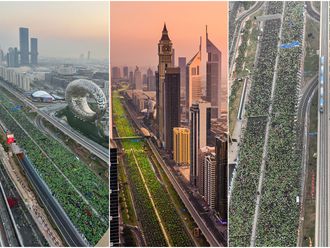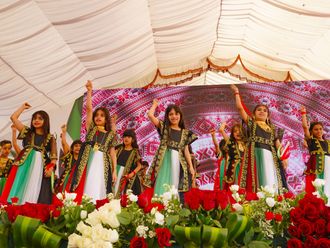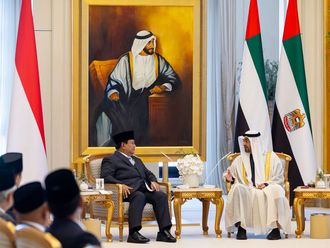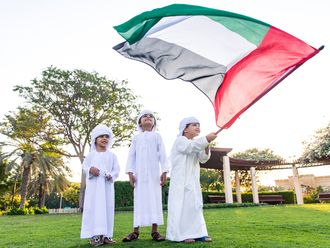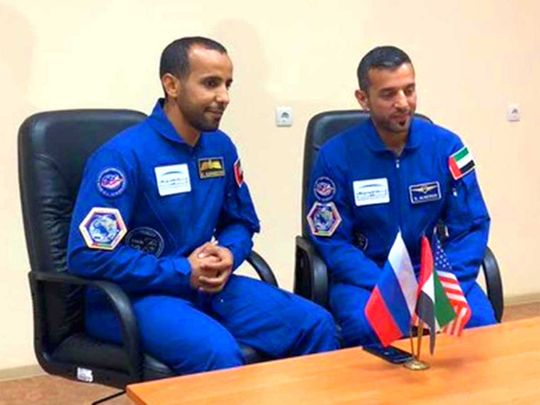
Dubai: The level excitement and anticipation is getting higher as the day comes closer for the reveal of the two new Emirati astronauts who will join pioneers Hazzaa AlMansoori and Sultan AlNeyadi.
The Mohammed Bin Rashid Space Centre (MBRSC) tweeted another video teaser on Friday: “2 Emiratis will be chosen out of 4,305 candidates to form the second batch of the UAE Astronaut Programme. Who will join Hazzaa AlMansoori and Sultan AlNeyadi?”
Also on Thursday, AlMansoori – the first Emirati to be deployed on a space mission to the International Space Station (ISS), tweeted a photo of himself and AlNeyadi with a caption: “In a few days, 2 new Emirati astronauts will join Sultan and me. They have been chosen from 4,305 candidates after undergoing a series of tests and interviews. We are excited to work with them and garner new milestones for the UAE’s space sector.”
AlNeyadi, the back-up astronaut for the 2019 mission to ISS, likewise posted a photo of him and AlMansoori plus the logo of the UAE Astronauts Corps with a welcoming caption: “Hazzaa and I will not continue our training alone as 2 new astronauts will join us soon. During the phases of selecting the second batch of the UAE Astronaut Programme, I felt great enthusiasm and now, it is bigger as we approach the announcement of the new Emirati astronauts.
Advanced space missions
MBRSC said the new set of astronauts will “prepare themselves for new advanced space missions.”
The UAE Astronaut Programme was initiated in April 2017 by His Highness Sheikh Mohammed bin Rashid Al Maktoum, Vice-President and Prime Minister of the UAE and Ruler of Dubai, and His Highness Sheikh Mohamed Bin Zayed Al Nahyan, Crown Prince of Abu Dhabi and Deputy Supreme Commander of the UAE Armed Forces, to prepare an Emirati astronaut corps for scientific space exploration missions, creating a culture of scientific endeavor and motivating the youth to pursue space science and technology.
AlMansoori and AlNeyadi were chosen in 2018 from over 4,000 Emirati applicants. MBRSC noted: “future generations of UAE scientists and engineers are now being inspired to make STEM (science, technology, engineering, and mathematics) subjects their focus and to build a career in this dynamic and exciting industry.”
Stringent screening
The UAE Astronaut Programme is one of the projects managed by the UAE’s National Space Programme and funded by the ICT (Information and Communications Technology) Fund of the Telecommunications Regulatory Authority (TRA), which aims to support research and development in the ICT sector in the UAE and prepare a team of Emiratis for scientific space missions.
Aspiring Emirati astronauts have undergone comprehensive and intensive screening process. Out of the of 4,305 candidates, 14 candidates – nine men and five women – have qualified for the final phase of the second batch of the UAE Astronaut Programme. AlMansoori, AlNeyadi, along with NASA (National Aeronautics and Space Administration) astronauts Anne McClain and Jessica Meir were part of the panel that conducted the final interviews.
“The average age of the (final) 14 applicants is 31 years, with the youngest candidate being 24 years old and the oldest at 38. The applicants have diverse educational backgrounds – nine of them hold a bachelor’s degree; four a master’s degree; and one with a doctorate degree. In terms of professional backgrounds, nine candidates were from the engineering sector, four from the aviation sector and one from meteorology,” the MBRSC said in an earlier statement sent to Gulf News.
“The two astronauts from the second batch of the UAE Astronaut Programme will join the ‘2021 NASA Astronaut Candidate Class’, as part of a joint strategic agreement between the UAE and the United States of America, to train them at NASA’s Johnson Space Centre. The new astronauts will undergo a training plan within the UAE to ensure that they are ready to train with NASA astronauts,” it added.
MBRSC noted a total of 4,305 applicants have applied for the second batch of the UAE Astronaut Programme. The list was initially trimmed to 2,099 applicants based on their age, educational background, and scientific research experience. The applicants then underwent IQ, personality and technical assessments before an initial list of 1,000 candidates were selected.
Following the evaluation of 1,000 candidates, MBRSC selected the top 122 applicants, who were then interviewed virtually. Based on the interviews, the 122 candidates were further evaluated, bringing down the shortlist to 61 applicants. After thorough medical examinations, the 61 shortlisted candidates were pared down to 30, who moved to the interview phase.
National space cadres
The final 14 candidates passed through an evaluation process, consisting of interviews conducted by a committee of specialists at MBRSC to select the second batch of the UAE Astronaut Programme. Yousuf Hamad AlShaibani, director General, MBRSC, said: “The final phase of assessments by Emirati astronauts Hazzaa and Sultan, and NASA astronauts, has added another dimension to the programme and increased the efficiency of the evaluation process.”
Salem AlMarri, assistant director general for Scientific and Technical Affairs and Head of the UAE Astronaut Programme at MBRSC, added: “MBRSC seeks to prepare national cadres who can contribute to knowledge sharing in the space sector. This will further equip the space sector with trained and expert personnel who will enable us to participate in future space exploration missions. The goal of the UAE Astronaut Programme is to establish a sustainable programme for the coming years.”


